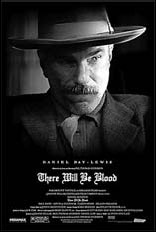


Directed by Paul Thomas Anderson, starring Daniel Day-Lewis, Paul Dano, Ciaran Hinds, Kevin J O'Connor, Dillon Freasier
This film is Paul Thomas Anderson's first since the curious Adam Sandler comedy Punch-Drunk Love five years ago. Dedicated to his mentor, Robert Altman, it's inspired by a long-forgotten novel, Oil!, written in 1927 by the muckraking socialist author Upton Sinclair.
The film's resonantly Old Testament title comes from the seventh chapter of Exodus where God, via Moses, orders Aaron to smite the waters so that "they may become blood; and that there may be blood throughout all the land of Egypt". In the context of the film this biblical blood is oil, the contaminating element dealt in by its forceful central character, the demonic Daniel Plainview (Daniel Day-Lewis), oil tycoon and upholder of untrammelled capitalism.
In early 20th-century California Plainview is set up against a young, charismatic preacher, Eli Sunday (Paul Dano), fanatical creator of the Church of the Third Revelation.
This hugely impressive film begins in the deserts of the American south-west, and no words are spoken during the first 20 minutes as a lone prospector digs deep down underground. When the prospector strikes silver and is stretched out with a damaged leg in an assay office, we learn his name when he signs a form "Daniel Plainview".
He uses his money to switch to oil drilling and eventually strikes it moderately rich and adopts the baby son of an employee killed down a well. One of his targets is the dirt-poor Sunday family who live on oil-rich land which becomes the basis for Plainview's fortune. But in the process he enters into financial obligations to the local population - schools, roads, water - and promises Eli Sunday backing for his fundamentalist church.
We gradually realize that Plainview and Eli are in their different ways deranged, and each is out to control or destroy the other. Plainview refuses to be intimidated by or to strike bargains with competitors, but there is something much more than greed or independence in his character. "I don't like to explain myself," he says, "I hate people... I have a compulsion to succeed... I want to earn enough to get away from everyone... I see the worst in people and things."
Is this the product of a psychosis or is it what unbridled capitalism in its extreme form does to its exponents? Are such people and their visions necessary for human progress? Anderson's film and Day-Lewis's performance, magnificent in their horrific, near-operatic grandeur, offer no easy answers. The Guardian